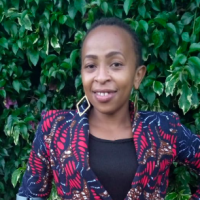
As a person with physical disability, I have always fancied the thought of moving out of my parents’ home and living on my own. My parents from a young age trained me to be independent, by ensuring that I undertake house chores and perform other responsibilities such as, looking after my siblings. This experience allowed me to discover potentials that I had and came up with unique ways of getting things done.
I have been privileged to have a roof over my head when growing up, however, the houses that we lived in weren’t accessible. At the time I was only a child and didn’t make much of it because matters regarding disability were not talked about. It is until I joined Kenyatta University and began to be active in disability advocacy that I realized accessibility was essential in the life of a person with disability. The university was at the forefront of ensuring that all the buildings and walk paths were accessible to students with disabilities. After graduating I tried looking for a job but when this was not successful, I venture into entrepreneurship. I registered a company in order to access 30% of government procurement opportunities set aside for women, youth and persons with disabilities. Accessibility to government offices and shops where I would get the products to supply, was a challenge. The buildings had no ramps and if they had the rumps were steep.
I managed to get a job as customer care representative at a call center in 2019 and this cemented my dream of moving out and becoming independent. Getting a house that would meet my needs was a challenge. I finally settled for one and each passing day, the house felt like prison. The cabinets, curtain rods, sink and hanging lines were too high. Whenever I went shopping the constant reminder of the steep stairs was daunting.
The caretaker of the apartment was kind enough to assist on most occasions but if he was not available it meant, I was stuck and must wait for someone to assist. This at times can be dangerous and breach privacy, because strangers know where I live. I remember there’s a time I couldn’t change a light bulb and- I have never managed to do it till date- I had to call my brother who lives 10 minutes away, to come and assist. Some would wonder why I couldn’t pick a house on the ground floor, well because they tend to be noisy and cold especially now that I am working from home because of the pandemic. Customers at the other end of the call would find it unprofessional serving them amid chaos in the background.
A lot of consideration should be put by real estate developers or landlords of the diverse range of people who will be living in their units, when designing houses either for rent or sale. In Nairobi, not many people can afford the rent in building with elevators. When houses are being built the landlords can consider putting a ramp at the gate rather than a step. The gate should also be wide enough to fit a wheelchair. The floor plans should have ramps as well and not too many steps placed in the kitchen, bathroom or the entrance.
Features and furnishing such as light switch, sinks, and even doorknobs should be placed low enough for ease of reach. These modifications not only favor persons with disabilities but other tenants like children or people who are elderly. The terrain in the neighborhood should also support the use of mobility devices, because often you will need to run to the shop to buy something and wet potholes could prove to be a challenge. To make the home disability friendly, at times we must cater for the adjustments which is not always welcomed by the landlords.
Article 19 of the convetion on the Rights of persons with disability states that persons with disabilities have a right to live independently and be included in the community. Persons with disabilities may be forced to continue living with their parents due to these barriers. To some extent, they may lose opportunities to work because of lack of better housing that is near their workplace or have to spend extra money on transportation to commute to work because the house that caters for their needs is far. As world leaders convene during GDS 2022, I would like for them to commit, to ensuring that persons with disabilities can live independently through the availability of accessible housing in their countries. In Kenya, the County governments, National Environment Management Authority (NEMA) and National Construction Authority (NCA)need to ensure that on the building plans should show how accessible the structure would be to persons with disabilities before approval.
By
Jackline Njeri, 29 years, Gifted Community Centre-GCC Disability Advocate, Kenya.


